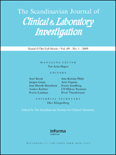
SCANDINAVIAN JOURNAL OF CLINICAL & LABORATORY INVESTIGATION
Scope & Guideline
Pioneering research in clinical biochemistry.
Introduction
Aims and Scopes
- Clinical Laboratory Diagnostics:
The journal publishes research related to the development, validation, and application of diagnostic tests and methods, including biochemical assays, molecular diagnostics, and point-of-care testing. - Biomarker Discovery and Validation:
A core area of focus involves identifying and validating biomarkers for various diseases, including cancer, cardiovascular diseases, and infectious diseases, contributing to early diagnosis and personalized medicine. - Methodological Innovations in Laboratory Techniques:
The journal highlights novel methodologies and technologies in laboratory investigations, such as advancements in mass spectrometry, flow cytometry, and automation in laboratory processes. - Preanalytical and Analytical Factors:
Research addressing preanalytical variables affecting test results, such as sample handling, storage conditions, and interference from hemolysis or other factors, is a significant focus. - Clinical Implications of Laboratory Findings:
Studies exploring the clinical relevance of laboratory results and their impact on patient management, treatment outcomes, and public health are regularly featured. - Public Health and Epidemiological Studies:
The journal also includes research related to public health, focusing on the epidemiology of diseases and the role of laboratory investigations in disease outbreaks and population health.
Trending and Emerging
- Artificial Intelligence and Machine Learning Applications:
There is a growing trend in the application of AI and machine learning techniques for diagnostic purposes, including predicting disease outcomes and improving laboratory workflows. - Metabolomics and Proteomics:
Research in metabolomics and proteomics is increasingly prominent, focusing on the comprehensive analysis of metabolites and proteins to identify biomarkers for various diseases. - Point-of-Care Testing Innovations:
The emergence of novel point-of-care testing devices and methodologies is a key trend, aimed at improving accessibility and rapid diagnosis in clinical settings. - Impact of COVID-19 on Laboratory Practices:
The ongoing influence of the COVID-19 pandemic is evident, with studies examining laboratory responses, diagnostic challenges, and the long-term effects on public health practices. - Focus on Personalized Medicine:
Research emphasizing personalized medicine approaches, including tailored therapies based on genetic and biomarker profiling, is increasingly featured, reflecting a shift towards individualized patient care.
Declining or Waning
- Traditional Hematology Studies:
There is a noticeable decline in traditional hematology-related studies, such as those focusing solely on complete blood counts or basic blood component analyses, likely due to advancements in more complex diagnostic techniques. - Basic Biochemical Assays:
Research centered on standard biochemical assays, such as routine liver and kidney function tests, is less frequent, as newer methodologies and biomarkers gain attention. - Single-Center Retrospective Studies:
The prevalence of single-center retrospective studies appears to be waning in favor of multicenter studies and collaborative research efforts that offer broader insights and more robust data. - General Reviews and Meta-Analyses:
The frequency of general reviews and meta-analyses without novel findings has decreased, indicating a shift towards more original research that contributes new knowledge to the field. - Low-Impact Case Reports:
While case reports are valuable, there seems to be a decline in low-impact case reports that do not significantly advance understanding or clinical practice.
Similar Journals
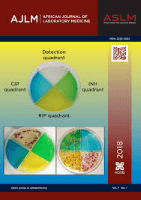
African Journal of Laboratory Medicine
Enriching public health through shared knowledge.The African Journal of Laboratory Medicine, ISSN 2225-2002, e-ISSN 2225-2010, is a premier publication dedicated to advancing the field of laboratory medicine within the African context. Published by AOSIS since 2012, this Open Access journal aims to disseminate influential research findings, clinical studies, and innovative techniques in the realms of Clinical Biochemistry, Medical Laboratory Technology, and Public Health. Based in South Africa, the journal not only serves as a critical platform for sharing knowledge and best practices but also plays a significant role in fostering public health discussions relevant to the continent. Over the years, it has established itself with impactful rankings in various categories, including a Q4 in Clinical Biochemistry and Q3 in both Medical Laboratory Technology and Public Health. As such, it caters to a diverse audience of researchers, professionals, and students eager to stay at the forefront of laboratory medicine research and its applications. The journal’s commitment to quality and accessibility positions it as an essential resource for those looking to make a significant impact in their respective fields.

Pathology and Laboratory Medicine International
Unveiling innovations for improved clinical outcomes.Pathology and Laboratory Medicine International is a premier open-access journal, published by DOVE MEDICAL PRESS LTD, dedicated to advancing the field of pathology and laboratory medicine. Since its inception in 2009, this journal has provided a vital platform for researchers, clinicians, and educators to disseminate findings, challenges, and innovations that shape laboratory practices and pathology diagnostics. With an emphasis on peer-reviewed, high-quality research, Pathology and Laboratory Medicine International aims to enhance knowledge and improve clinical outcomes by sharing best practices and emerging trends in the discipline. As an open-access publication, it ensures global accessibility to critical research findings, fostering an inclusive academic environment. The journal holds a commendable reputation within the scientific community, making it a valuable resource for students, professionals, and researchers committed to excellence in the field.

Biochemia Medica
Exploring the Intersections of Biochemistry and MedicineBiochemia Medica is a premier open-access journal that has been at the forefront of advancing knowledge in the fields of medical biochemistry and laboratory medicine since its inception in 2006. Published by the Croatian Society of Medical Biochemistry & Laboratory Medicine, this journal serves a vital role in disseminating high-quality research findings and reviews that contribute to the understanding of biochemical processes in health and disease. With an impressive performance in the Scopus ranking, it holds a Q2 quartile category in both medical biochemistry and clinical biochemistry for 2023, reflecting its commitment to scholarly excellence and relevance in the field. As an open-access journal, Biochemia Medica ensures that research is freely accessible, fostering collaboration and innovation among researchers, healthcare professionals, and students globally. Positioned within a rapidly evolving scientific landscape, this journal is dedicated to bridging the gap between laboratory research and clinical application, making it an indispensable resource for anyone interested in the intersections of biochemistry and medicine.
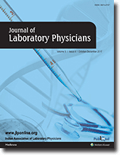
Journal of Laboratory Physicians
Unlocking the potential of laboratory science for better healthcare.The Journal of Laboratory Physicians is a prestigious, peer-reviewed publication dedicated to advancing the field of laboratory medicine. Published by THIEME MEDICAL PUBL INC, this journal has established itself as a vital source of research and clinical insights since its inception, transitioning to Open Access in 2009 to broaden its reach and accessibility. With an ISSN of 0974-2727 and an E-ISSN of 0974-7826, it aims to provide a platform for professionals, researchers, and students engaged in laboratory-based studies to share critical findings and foster collaboration across disciplines. The journal's scope encompasses a wide range of topics relevant to laboratory physicians, ensuring that it remains an essential resource for those seeking to stay on the cutting edge of laboratory practices and innovations. By disseminating timely research and reviews, the Journal of Laboratory Physicians plays a crucial role in enhancing the quality of healthcare through improved laboratory services.

Clinical Pathology
Championing Open Access to Transformative Medical KnowledgeClinical Pathology, an esteemed journal published by SAGE Publications Ltd, stands at the forefront of advancing knowledge in the intersection of histology, microbiology, and pathology. As an Open Access journal since 2019, it provides researchers and healthcare professionals seamless access to high-quality, peer-reviewed articles that contribute to the field's growing body of knowledge. With a focus on enhancing diagnostic methodologies and advancing clinical applications, Clinical Pathology serves a diverse audience eager to explore innovative research and practical insights. The journal currently holds Q3 status in Histology and Pathology and Forensic Medicine, and Q4 in Medical Microbiology, reflecting its commitment to rigorous scholarship within a competitive landscape. Its ranking in Scopus further positions it as a vital resource for professionals striving for excellence in clinical and experimental pathology. We invite researchers, students, and professionals to engage with the latest findings and share their valuable contributions to help propel the field forward.
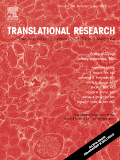
Translational Research
Transforming Science into Health SolutionsTranslational Research, published by Elsevier Science Inc, stands at the forefront of the rapidly evolving fields of biochemistry, medicine, physiology, and public health. With an impressive 2023 Q1 ranking in these categories, this journal has established itself as a critical platform for disseminating innovative research that bridges the gap between laboratory findings and clinical application. The journal, which has been converging knowledge since 2006, is committed to advancing scientific understanding and improving health outcomes by publishing high-quality articles that reflect rigorous peer review and impactful findings. With its impressive Scopus rankings, including a rank of #5 in Biochemistry and #7 in Physiology, it is an essential resource for researchers, practitioners, and students dedicated to the translation of scientific breakthroughs into real-world health solutions. Transitioning to an open-access model, the journal enhances accessibility and engagement, inviting a global audience to participate in the discourse shaping the future of healthcare and disease management.

JOURNAL OF CLINICAL PATHOLOGY
Pioneering Research in Clinical PathologyJOURNAL OF CLINICAL PATHOLOGY, published by BMJ PUBLISHING GROUP, stands at the forefront of advancements in the field of clinical pathology, offering a platform for groundbreaking research and insights from 1948 to the present. With an impressive impact factor and categorized as Q1 in both Medicine (miscellaneous) and Pathology and Forensic Medicine for 2023, the journal holds a distinguished position in the academic community, ranking 22nd out of 208 journals in its category on Scopus and representing the 89th percentile. While the journal does not currently offer open access, it remains a vital resource for researchers, healthcare professionals, and students seeking to stay current with innovative methodologies, clinical techniques, and diagnostic advancements. Located in London, United Kingdom, the journal aims to bridge the gap between laboratory findings and clinical practice, emphasizing the importance of evidence-based pathology in improving patient care and treatment outcomes. Engage with the JOURNAL OF CLINICAL PATHOLOGY to enhance your understanding and contribute to the evolving landscape of clinical pathology research.
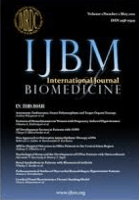
International Journal of Biomedicine
Connecting researchers to shape the future of biomedicine.International Journal of Biomedicine, published by INT MEDICAL RESEARCH & DEVELOPMENT CORP, is a premier Open Access journal dedicated to advancing knowledge in the multifaceted fields of biomedicine, including but not limited to biochemistry, genetics, immunology, microbiology, and neuroscience. With its ISSN 2158-0510 and E-ISSN 2158-0529, this journal has been serving as a significant platform for researchers since its inception in 2011, ensuring the dissemination of high-quality, peer-reviewed articles. Despite currently holding a Q4 ranking in prominent categories such as Biochemistry, Genetics and Molecular Biology and Neuroscience, the journal plays a vital role in fostering scientific dialogue and innovation in these rapidly evolving domains. The journal's commitment to accessibility further empowers both seasoned professionals and budding scholars to contribute to, and benefit from, the wealth of research that characterizes the biomedicine landscape. With a significant emphasis on interdisciplinary approaches and contemporary issues, the International Journal of Biomedicine is an essential resource for those aiming to navigate the complex intersections of health, disease, and biomedical discovery.

Journal of Mass Spectrometry and Advances in the Clinical Lab
Fostering Collaboration in Laboratory SciencesJournal of Mass Spectrometry and Advances in the Clinical Lab, published by Elsevier, serves as a premier resource within the fields of clinical biochemistry, medical laboratory technology, microbiology, and spectroscopy. Launched in 2021 with an Open Access model, this journal enhances the accessibility of innovative research, making it an ideal platform for researchers, practitioners, and students alike. With an impressive impact factor reflected in its quartile rankings—Q2 in Clinical Biochemistry and Microbiology, and Q1 in Medical Laboratory Technology and Spectroscopy—this journal ensures high visibility and credibility. The journal's diverse indexing and significant standings in Scopus rankings highlight its commitment to advancing knowledge and fostering collaboration among professionals in laboratory sciences. Endorsed by a robust editorial board comprising leading experts, the journal aims to disseminate cutting-edge findings and methodologies, contributing to significant advancements in clinical and scientific laboratory practices. By bridging theoretical frameworks and practical applications, this journal plays a crucial role in the continuous evolution of laboratory technologies, thereby empowering readers to push the boundaries of research and innovation in their fields.
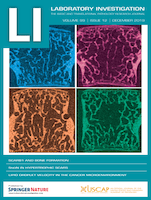
LABORATORY INVESTIGATION
Unveiling Insights in Forensic and Molecular ResearchLaboratory Investigation is a premier academic journal published by Elsevier Science Inc, specializing in the fields of Pathology, Forensic Medicine, Cell Biology, and Molecular Biology. With its ISSN 0023-6837 and E-ISSN 1530-0307, this journal has been a significant contributor to scientific discourse since its inception in 1952, converging into its current form by 2024. It holds an impressive standing in its respective fields, featuring a 2023 Journal Rank of Q2 in both Cell Biology and Molecular Biology, and an elite Q1 ranking in Pathology and Forensic Medicine, reflecting its influence and quality of research, as seen in its Scopus ranks—17th out of 208 in Pathology and Forensic Medicine. Although it does not offer Open Access options, the journal remains a vital resource for researchers, professionals, and students who seek to disseminate and engage with high-caliber research findings. The importance of Laboratory Investigation is underscored by its commitment to advancing the understanding of laboratory and translational medicine, paving the way for innovations that enhance clinical practices.